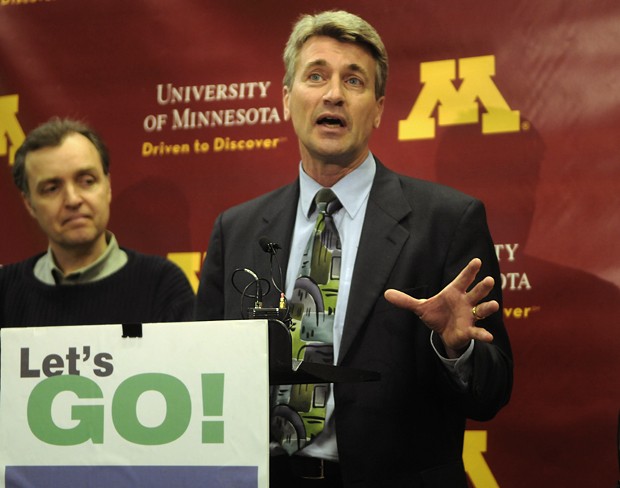Minneapolis and University of Minnesota officials announced at a press conference Tuesday that there would be more funding for the local biking scene. Despite extra cash, bicyclists looking to take advantage of a city bicycle-sharing program are going to have to wait even longer than expected. As part of $4 million in federally funded projects announced Tuesday, the University of Minnesota received $524,000 for a bike facility on campus. The Minneapolis bike-share program, which has been pushed back almost a year, received $1.75 million in funds that could bring 1,000 bikes to 75 locations around the city, including the University. The program was originally expected to start in May 2009 and is now pushed to spring 2010. The $4 million was awarded by Transit for Livable Communities, a Twin Cities nonprofit that is designated by federal law to administer a total of $21.5 million to increase biking and walking in the metro area, and decrease car commuting. The funding awarded Tuesday was the third installment of that initiative.
A European Model
Minneapolis Mayor R.T. Rybak said he is tired of hearing people rave about the bicycle-sharing programs in Paris and Barcelona. âÄúThey ask me why we donâÄôt have a program like that here,âÄù he said. But MinneapolisâÄô proposed program jumped a major hurdle securing the federal funding, and the city is now one step closer to implementing the program âÄî the first of its kind in the United States. But Bill Dossett, a volunteer for the Nordic Ski Foundation, the nonprofit group chosen to develop the program, said despite securing this funding, the program still needs to get $1.6 million more. The program will allow residents to sign up for a one-year, $50 membership on the Internet, which gives them access to the bicycles for half-hour increments at no extra charge. Nonmembers can sign up at a kiosk to use a bike for about $5 a day. Current plans will put 75 kiosks in locations in Downtown and Uptown Minneapolis, and near the University, but Rybak said there are hopes to expand the program to St. Paul.
Tracking campus bicyclists
The University Bike Center will be located in the now dormant Oak Street Parking Ramp transit station waiting area, and will include a bicycle trip planning kiosk, 24-hour bicycle storage, changing facilities and repair and retail service. University President Bob Bruininks said at the press conference Tuesday that the center will serve the 6,000 on-campus bicycle commuters, and will be located next to Territorial Hall and other student housing. Steve Sanders, bicycle coordinator for the University, said the plan is to open the center by fall semester, but that date is subject to change. âÄúItâÄôs a federal aid project, so sometimes things donâÄôt move as fast as you would like them to,âÄù Sanders said. The funds will also support new radio technology that will track bicycle commuter trips. Radio Frequency Identification is a tag-like device that, when attached to a bicycle, tracks how many trips a bicyclist is making and to where. Twenty censors will be placed on campus that will coordinate with the tags to track trips. Sanders said this information may be used in research at the University to see how many people are commuting and where they are going. Four other projects also received funding Tuesday, including pedestrian enhancements in Minneapolis and the creation of a St. Paul bike boulevard âÄî a shared roadway that gives priority to bicyclists over cars.








